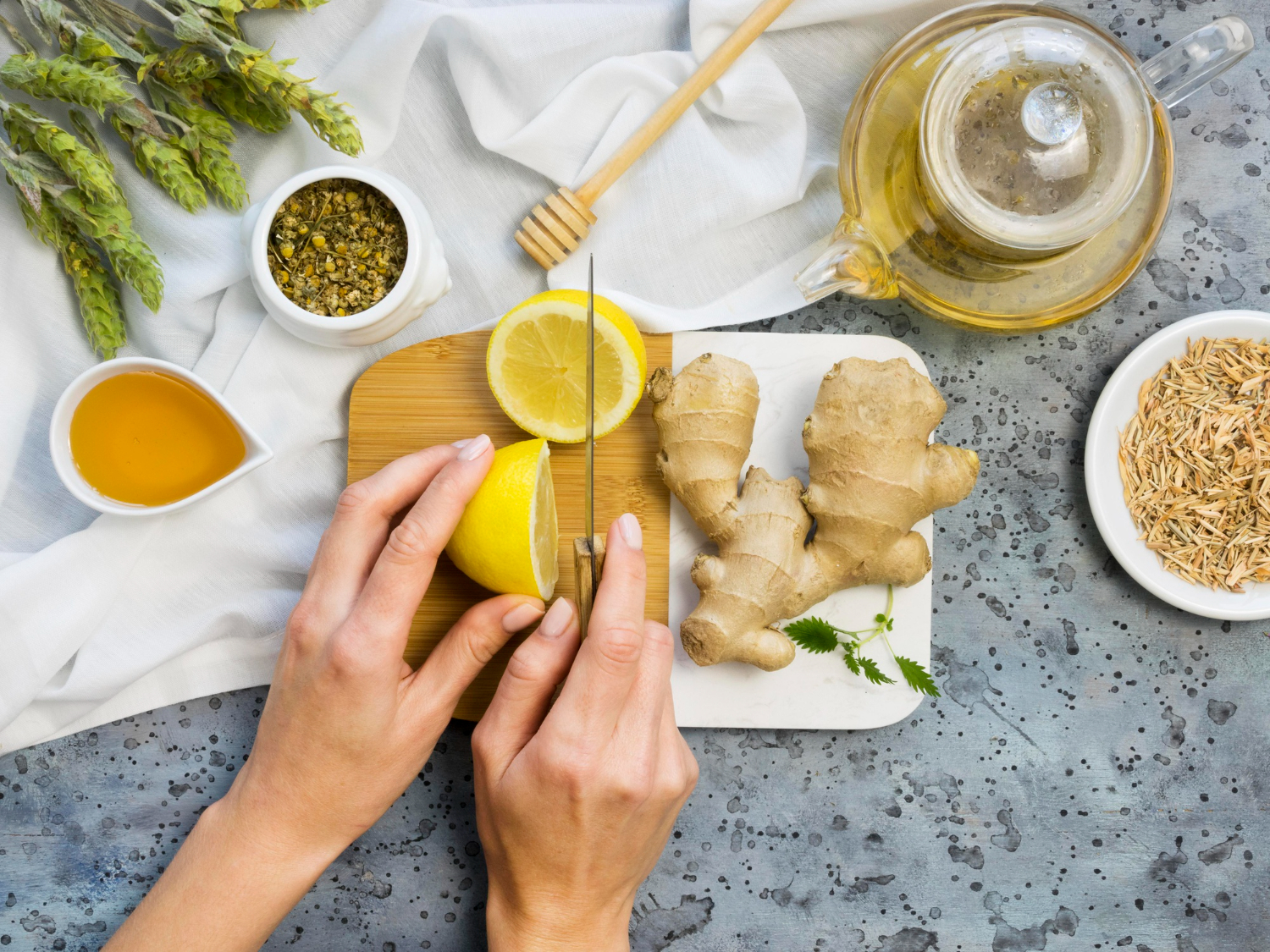Ginger for Nausea:
- Why it works: Ginger has compounds like gingerol and shogaol that help speed up stomach emptying and have anti-nausea effects. It can be particularly helpful for motion sickness and morning sickness.
Gargle Warm Salt Water for a Sore Throat:
- Why it works: Gargling with warm salt water can help reduce swelling and kill bacteria in the throat. The salt draws out excess fluid from inflamed tissues and helps clear mucus.
Blackstrap Molasses for Constipation:
- Why it works: Blackstrap molasses is rich in magnesium and magnesium can help relax muscles and act as a stool softener.
Turmeric for Inflammation:
- How it works: Turmeric contains curcumin, a powerful anti-inflammatory and antioxidant that can help reduce inflammation and pain.
Peppermint Essential Oil or Peppermint Tea for Digestive Issues
- Why it works: Peppermint has antispasmodic properties, which when taken internally can relax the muscles of the gastrointestinal tract.
Peppermint Essential Oil or Peppermint Tea for Headaches
- Why it works: The menthol in peppermint increases blood flow and when used topically as an essential oil, has a cooling sensation that can reduce headache symptoms.
Chamomile Tea for Insomnia:
- Why it works: Chamomile has mild sedative effects and contains an antioxidant that binds to brain receptors that promote sleepiness and reduce insomnia.
Honey for Coughs:
- Why it works: Honey has antimicrobial properties and can soothe the throat, reducing irritation and suppressing coughs.
Aloe Vera for Burns:
- Why it works: Aloe vera gel has anti-inflammatory, moisturizing, and cooling properties that can help soothe and heal minor burns, including sunburns.
Garlic for Earaches or a Cold:
- Why it works: Garlic has antiviral, antibacterial, and immune-boosting properties. When you chop, crush, or chew fresh garlic, it undergoes a chemical reaction that significantly enhances these health benefits. For earaches, steep freshly chopped garlic in olive oil for a few minutes before straining out and using a few drops of the garlic olive oil in the affected ear.
Epsom Salt Baths for Muscle Soreness:
- Why it works: Epsom salt contains magnesium sulfate, which can be absorbed through the skin. The magnesium helps relax muscles and reduce inflammation.
Lavender for Anxiety and Sleep Disorders:
- Why it works: Lavender oil has calming and sedative effects that can help reduce anxiety, improve mood, and promote better sleep.
Apple Cider Vinegar for Acid Reflux:
- Why it works: Apple cider vinegar can help balance stomach acid levels and improve digestion. Dilute a tablespoon in water and drink it before meals to help reduce acid reflux symptoms.
Cranberry Juice for Urinary Tract Infections:
- Why it works: Cranberry juice (opt for unsweetened!) contains compounds that can prevent bacteria from adhering to the walls of the urinary tract, reducing the risk of infections.
Tea Tree Oil for Acne:
- Why it works: Tea tree oil has strong antibacterial and anti-inflammatory properties. It can be applied topically to help reduce and prevent acne.
Cinnamon for Blood Sugar Control:
- Why it works: Cinnamon has been shown to improve insulin sensitivity and lower blood sugar levels, making it a helpful supplement for those managing type 2 diabetes.
Coconut Oil for Dry Skin:
- Why it works: Coconut oil is rich in fatty acids that help moisturize dry skin. It also has antimicrobial properties that can protect skin from infections.
Clove Oil for Toothaches:
- Why it works: Clove oil contains eugenol, a natural anesthetic and antibacterial agent. Applying a small amount of clove oil to the affected area can help numb pain and control infection.
Elderberry for Cold and Flu:
- Why it works: Elderberry has antiviral properties that can boost the immune system and reduce cold and flu symptoms.
When to Avoid Natural Remedies and Contact a Medical Provider:
- Severe Symptoms: If you experience severe pain, high fever, difficulty breathing, chest pain, or severe headaches, contact a healthcare provider immediately.
- Persistent Symptoms: If your symptoms persist despite using natural remedies for a reasonable amount of time (e.g., several days for minor issues), it’s time to consult a doctor.
- Serious Conditions: For conditions like diabetes, heart disease, cancer, or any other chronic illness, always consult with your healthcare provider before trying natural remedies.
- Allergic Reactions: If you develop signs of an allergic reaction such as rash, itching, swelling, severe dizziness, or trouble breathing after using a natural remedy, seek medical attention immediately.
- Interactions with Medications: Some natural remedies can interact with prescription medications. Always discuss with your healthcare provider if you are taking any medications to avoid adverse interactions.
Natural remedies can be powerful allies in promoting health and alleviating discomfort, but they aren’t always a substitute for professional medical care when it’s needed. It’s essential to listen to your body, be mindful of persistent or severe symptoms, and consult a healthcare provider when natural remedies fall short. A balanced approach—embracing the benefits of nature while recognizing the value of medical expertise—ensures you’re making the best choices for your health. Always remember, your health is worth prioritizing, and knowing when to seek help is just as important as knowing how to heal naturally.
Learn more about Dr. Scott Noorda, DO here: www.resolvemedical.us/dr-scott-noorda




